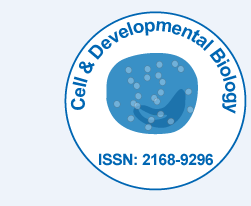
Cell & Developmental Biology
Open Access
ISSN: 2168-9296
+44 1478 350008

ISSN: 2168-9296
+44 1478 350008
Perspective - (2023)Volume 12, Issue 6
DNA methylation, a significant epigenetic modification, plays an important role in regulating gene expression and maintaining cellular identity. In recent years, researchers have increasingly turned their attention to studying DNA methylation in blood, recognizing its potential as a valuable biomarker for various health conditions. This article delves into the intricate world of DNA methylation in blood, exploring its significance, methods of analysis, and its implications in health and disease. In blood, DNA methylation is essential for the proper functioning of hematopoietic cells, which give rise to various blood cell types. Aberrant DNA methylation patterns in blood cells have been associated with hematological malignancies, such as leukemia and lymphoma. Additionally, alterations in blood DNA methylation have been implicated in non-hematological conditions, including cardiovascular diseases, autoimmune disorders, and neurodegenerative diseases.
Biochemistry DNA methylation
DNA methylation is a fundamental biochemical process that plays a significant role in the regulation of gene expression and maintenance of cellular identity. This epigenetic modification involves the addition of a methyl group (-CH3) to the cytosine base of DNA, forming 5-methylcytosine. The majority of DNA methylation occurs at cytosine-guanine (CpG) dinucleotides, where the carbon-5 position of the cytosine ring is methylated. Enzymes involved in DNA Methylation are de novo methyltransferases that are mentioned below
DNMT1: Maintenance methyltransferase, responsible for copying existing methylation patterns during DNA replication.
DNMT3a and DNMT3b: De novo methyltransferases, involved in establishing new DNA methylation patterns during development.
Methods of analyzing DNA methylation
Several techniques are employed to study DNA methylation in blood samples. DNA methylation arrays and bisulfite sequencing are commonly used methods that provide high-throughput data, allowing researchers to analyze methylation patterns across thousands of CpG sites. More recently, advanced technologies like next-generation sequencing have enhanced our ability to obtain detailed information about the methylome in blood.
Bisulfite sequencing: Converts unmethylated cytosines to uracil, leaving methylated cytosines unaffected. Sequencing reveals the methylation status of individual CpG sites.
Methylation-Specific PCR (MSP): Amplifies DNA regions with bisulfite-converted DNA, allowing the detection of methylated or unmethylated sequences.
Whole Genome Bisulfite Sequencing (WGBS): Provides a comprehensive view of DNA methylation across the entire genome, allowing the identification of differentially methylated regions.
DNA methylation and diseases
Cancer: Hypermethylation of tumor suppressor gene promoters and hypomethylation of oncogene promoters contribute to tumorigenesis.
Neurological disorders: Altered DNA methylation patterns have been implicated in neurological disorders, including Alzheimer's and Parkinson's disease. Methylation changes can affect the expression of genes involved in neuronal function.
Cardiovascular diseases: DNA methylation is associated with cardiovascular diseases, influencing the expression of genes involved in vascular function, lipid metabolism, and inflammation.
Clinical applications
Despite the possible potentials of DNA methylation in blood as a diagnostic and prognostic tool, challenges remain. Standardization of methodologies, addressing sample heterogeneity, and deciphering the functional consequences of specific methylation changes are ongoing areas of research. As our understanding of the epigenetic landscape expands, blood DNA methylation is likely to play an increasingly important role in personalized medicine and disease management.
DNA methylation in blood represents a productive and informative aspect of the epigenome, Posessing substantial potential for uderstanding and diagnosing various health conditions. Ongoing research continues to unveil the intricacies of blood DNA methylation, paving the way for innovative diagnostic and therapeutic approaches that could revolutionize the field of medicine. As technology advances and our understanding deepen, blood DNA methylation is poised to become a key principle in the realm of precision medicine.
Citation: Even MM (2023) Study of DNA Methylation in Blood by Using Potential Biomarkers. Cell Dev Biol. 12:313
Received: 17-Oct-2023, Manuscript No. CDB-23-28240; Editor assigned: 20-Oct-2023, Pre QC No. CDB-23-28240 (PQ); Reviewed: 03-Nov-2023, QC No. CDB-23-28240; Revised: 10-Nov-2023, Manuscript No. CDB-23-28240 (R); Published: 17-Nov-2023 , DOI: 10.35248/2168-9296.23.12.313
Copyright: © 2023 Even MM. This is an open-access article distributed under the terms of the Creative Commons Attribution License, which permits unrestricted use, distribution and reproduction in any medium, provided the original author and source are credited.